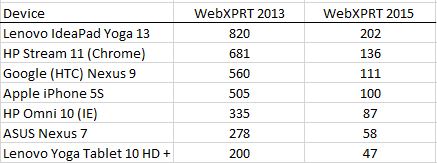Last week, we talked about porting TouchXPRT 2014 to be a Windows 10 universal app. This will let it run on devices running Windows 10 and those running Windows 10 mobile.
We won’t be retiring TouchXPRT 2014 when we release the Windows 10 universal app version. Windows 8 doesn’t support Windows 10 universal apps, but Windows 10 will be able to run Windows 8 applications. This means you’ll also be continue to be able to use TouchXPRT 2014 to test Windows 8 based systems, as well as to compare Windows 8 and Windows 10 performance.
The results from TouchXPRT 2014 and the universal app version of the benchmark won’t be compatible. Even though the test scenarios will be the same, the porting process means that we have to change the APIs the benchmark is using and rebuild the benchmark with different tools.
We’re currently debating changing the way we version the benchmarks. As the number of versions of each benchmark increases, it may make sense to move away from year-based versioning. This will obviously affect what we call the new Windows 10 version of TouchXPRT. If you have any thoughts on this, please let us know!
Eric















